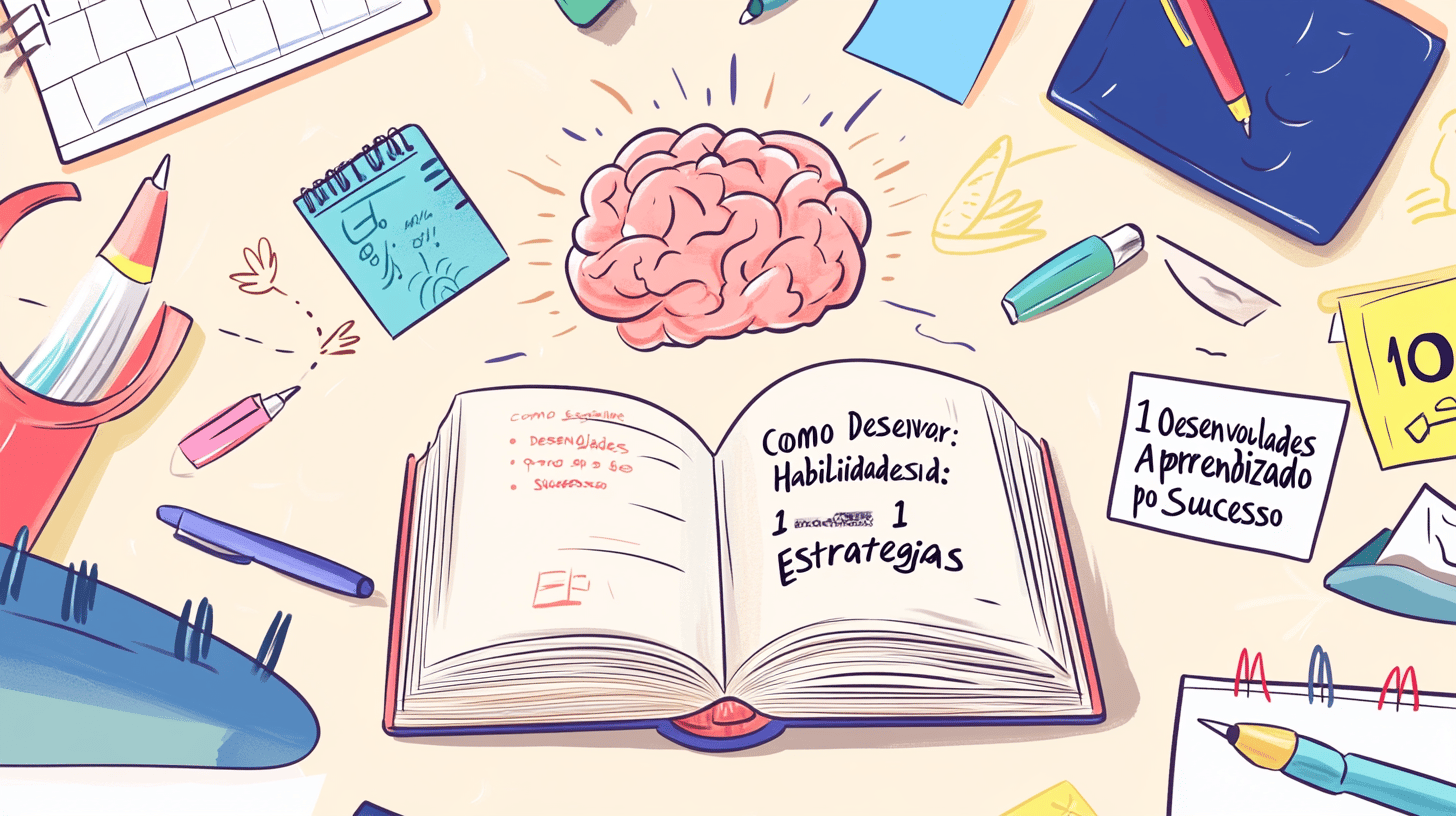Aprender é uma das atividades mais fundamentais da vida humana. À medida que enfrentamos um mundo em constante mudança, a capacidade de aprender e se adaptar se torna cada vez mais crucial. Neste post, exploraremos 10 estratégias eficazes que ajudarão você a desenvolver habilidades de aprendizado e maximizar sua capacidade de adquirir novos conhecimentos. As dicas a seguir são práticas e podem ser aplicadas em diversos contextos, seja em ambientes acadêmicos, profissionais ou na vida pessoal.
1. Entenda o seu estilo de aprendizado
O primeiro passo para otimizar o aprendizado é entender como você aprende melhor. Existem diferentes estilos de aprendizado, incluindo:
– Visual: Aprende por meio de imagens e diagramas. – Auditivo: Aprende ouvindo e discutindo informações. – Cinestésico: Aprende melhor por meio de atividades práticas e experiências.
Cada pessoa pode ter uma combinação desses estilos, então, identifique qual predomina em você e tente estruturar seu aprendizado baseado nisso. Por exemplo, se você é um aprendiz visual, utilize diagramas e gráficos para absorver melhor o conteúdo.
2. Defina metas claras
Ter metas claras e específicas facilita o processo de aprendizado. Ao definir objetivos de curto, médio e longo prazo, você pode se manter motivado e focado. Para eficácia, use o método SMART para definir suas metas:
– S (Específico): A meta deve ser clara e bem definida. – M (Mensurável): É preciso ter formas de medir seu progresso. – A (Atingível): As metas devem ser realistas e alcançáveis. – R (Relevante): A meta deve ter importância para você. – T (Temporal): Determine um prazo para alcançá-las.
3. Pratique a revisão espaçada
Uma das técnicas mais formuladas na ciência da aprendizagem é a revisão espaçada. Essa técnica envolve revisar o material em intervalos ao longo do tempo em vez de fazer uma única sessão de estudo. Por exemplo, você pode revisar suas anotações na primeira, terceira e sexta semana após aprender o conteúdo. Essa abordagem ajuda a consolidar as informações na memória de longo prazo.
4. Faça conexões com o que já sabe
Tentar relacionar novos conhecimentos com informações já existentes pode facilitar a compreensão. Quando você tem um ponto de referência familiar, a aprendizagem se torna mais eficiente. Isso pode ser feito através de:
– Comparações: Relacione conceitos novos com os antigos. – Analogias: Use comparações para ilustrar como funcionam as novas ideias. – Aplicações práticas: Tente aplicar novos conceitos em situações do dia a dia.
5. Utilize a técnica Feynman
Uma das melhores maneiras de aprender algo profundamente é ensiná-lo. A técnica Feynman consiste em resumir o que você aprendeu como se estivesse explicando para outra pessoa, preferencialmente uma criança. Esse método não só revela lacunas em seu conhecimento como também reforça a compreensão do tópico. Tente seguir estes passos:
1. Escolha um conceito que você aprendeu e escreva tudo o que sabe sobre ele. 2. Explique isso como se estivesse ensinando a alguém que não tem conhecimento sobre o assunto. 3. Revise suas explicações. Onde você ficou confuso? Pesquise sobre esse tópico novamente e melhore sua explicação.
6. Diversifique suas fontes de aprendizado
O aprendizado pode ser enriquecido quando você expande suas fontes de informação. Em vez de depender de um único livro ou curso, busque por podcasts, vídeos, webinars, workshops e discussões em fóruns online. Isso não apenas oferece diferentes perspectivas sobre o assunto, mas também pode tornar o aprendizado mais dinâmico e interessante. Dicas para diversificar suas fontes: – Inscreva-se em cursos online em diferentes plataformas. – Use aplicativos para aprender no seu ritmo. – Participe de grupos de estudo ou clubes do livro.
7. Pratique a auto-reflexão
Refletir sobre o que você aprendeu recentemente é uma estratégia poderosa. Reserve um tempo após suas sessões de aprendizagem para pensar sobre: – O que você aprendeu? – O que funcionou bem e o que não funcionou? – Quais são os próximos passos? Essa prática não apenas reforça o que você absorveu, mas também ajuda a desenvolver um plano de ação para o futuro, nutrindo uma mentalidade de crescimento.
8. Utilize a meditação e técnicas de atenção plena
Estudos têm mostrado que práticas como a meditação ajudam a melhorar a capacidade de concentração e memorização. Dedicando alguns minutos diariamente para práticas de atenção plena, você pode melhorar sua clareza mental e reduzir a ansiedade, o que pode impactar positivamente seu aprendizado. Experimente: – Meditações guiadas focadas em atenção plena. – Exercícios de respiração. – Pausas conscientes durante suas sessões de estudo.
9. Estabeleça uma rotina de aprendizado
Uma rotina estruturada ajuda a criar um ambiente propenso à aprendizagem. A regularidade nas práticas de estudo torna o aprendizado parte da sua vida diária. Ao criar uma rotina: – Determine horários específicos para estudar em um ambiente tranquilo e organizado. – Reserve um tempo para diferentes tópicos ou habilidades, evitando o estudo intenso de um único assunto, que pode levar ao esgotamento.
10. Cultive a curiosidade
Mantenha-se curioso e aberto a novas experiências. A curiosidade é um facilitador do aprendizado profundo e duradouro. Pergunte-se: – Como isso se conecta a outros tópicos que eu conheço? – Que perguntas eu gostaria de ser respondidas sobre esse assunto? – Que novas ideias ou perspectivas posso explorar? Ser ativo na busca por informações novas não só faz você aprender, mas também pode levar a descobertas e experiências enriquecedoras.
Conclusão
Desenvolver habilidades de aprendizado é um processo contínuo que requer dedicação e prática. Ao implementar essas 10 estratégias em sua rotina, você não só aumentará sua capacidade de aprendizado, mas também desenvolverá um apetite insaciável por conhecimento. Não hesite em experimentar diferentes abordagens e ajustar seu método de aprendizado de acordo com suas necessidades. Lembre-se, a jornada de aprender nunca termina, e cada etapa é uma oportunidade de crescimento. Agora, é hora de aplicar essas estratégias e trilhar seu caminho rumo ao aprendizado eficaz. Que tal iniciar agora mesmo? Comente abaixo como você aplica o aprendizado em sua vida!

